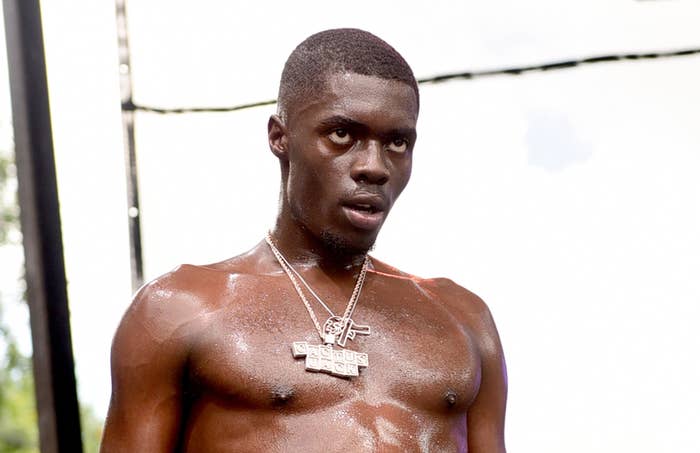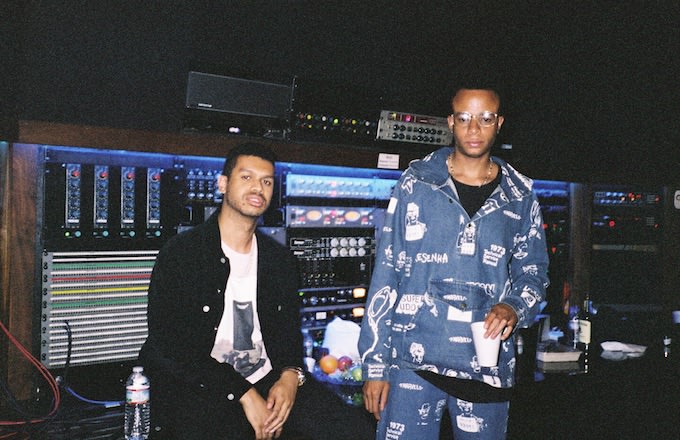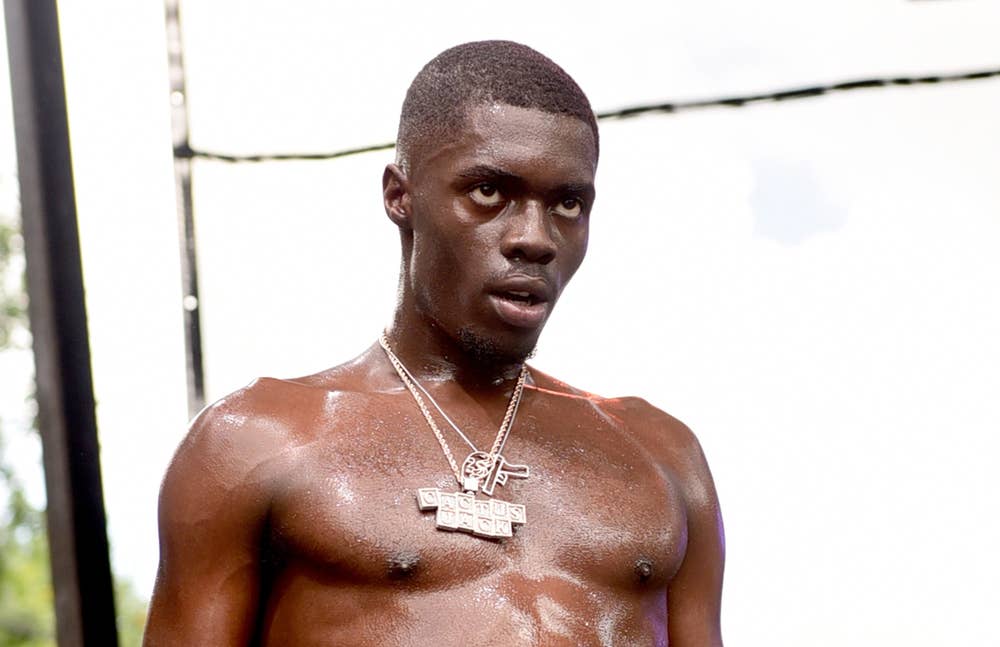
Hahahah zedd deleted his tweet 😂😂😂 pic.twitter.com/EqhMFIt5gS
Fellow EDM musician A-Trak saw Zedd’s tweet and responded, “It’s the best song of the year.” Alison Wonderland, another dance music DJ, gave her two cents with a simple “Mhm.”
Mhm
At this point, Zedd made his stance on the song clear. “You guys have absolutely lost your mind,” he tweeted.
Lol nope. Pure genius song. Total innovation. You have to see how it engages people in a club.
A-Trak tried to talk some sense into Zedd, tweeting that “Mo Bamba” was a “pure genius song” bolstered by “total innovation.” “You have to see how it engages people in a club,” he continued. Zedd tried to end the conversation with a generic “agree to disagree,” to which A-Trak replied that there actually is no way to objectively disagree, based on consistent crowd responses. He went so far as to invite Zedd out to see how the song rings off in public.
Haha u don’t have to apologize bro. The beautiful thing about music i:l: everyone can have their own opinions/ likes/ dislikes. I judge music by melody, chords, structure, lyrics. I’m a musician. :) how a club reacts doesn’t fall into my method of judgement :) to each their own<3
Instead of accepting the invitation, Zedd dug his heels in further and explained why he was okay with not liking the song: "I judge music by melody, chords, structure, lyrics. I'm a musician. :) how a club reacts doesn't fall into my method of judgement :) to each their own." Emoticons aside, the statement was a slap in the face to both Sheck and the producers of the song: Take A Daytrip and 16yrold.
Take A Daytrip—comprised of 25-year-olds Denzel Baptiste and David Biral, who met at the Clive Davis Institute at NYU nine years ago—responded to Zedd’s tweet and explained precisely how and why the song was in fact musically developed.
We spoke with Take A Daytrip about the value of minimalist music, Sheck Wes’ instinctual creative process, and how they use music theory in their production process.
When was the Zedd tweet brought to your attention and how?
Denzel Baptiste: We first saw the Zedd tweet when Joe [Coscarelli] from the New York Times posted it on his Instagram story. He did a piece on Zedd's “The Middle” right before he did a piece on “Mo Bamba” with us. He noticed the story because he has common interest between us. We actually thought [Zedd] was shouting the song out at first.
David Biral: We also hit up Joe on Saturday, too, because we were working with Sarah Aarons, the girl who wrote the song “The Middle.” It was just a complete random thing that Zedd actually tweeted about “Mo Bamba” the following day. At first, we were like, “Oh this is cool, Zedd's posting about ‘Mo Bamba.’” This is before A-Trak responded. When we started to see the response between A-Trak and Zedd, Zedd said something at one point where he was talking about how he judges songs off of chords and melodies and the musicality of a record. Then he said, “I'm a musician.” So for us, that's one thing that we wanted to clear up.
I feel like with hip-hop producers, a lot of times, simplicity is looked at as inexperience. For us, we just wanted to say, “Hey, we know a thing or two about music theory, as well. We know what it takes to make a song with chords and notes and what a tri-tone makes people feel.” Sometimes, these things aren't as random in hip-hop as some people think.

Your tweet really broke down the musicality of these chords. For those who are less experienced, can you explain exactly what you are breaking down here?
Denzel: When we were making this song—and when we make any song—it's not that we're sitting in the studio and thinking about what interval this is or what chord this is or really any of that. We just know what to do to invoke certain emotions. When making that song with Sheck and 16[yrold], that's exactly how they work too, and that's why we work so well together. They basically just work off intuition. Creating music in that way leads you to break the rules sometimes. It was really just us trying to invoke this specific emotion that Sheck was trying to get across. With that, just following the intuition, it kind of innovated a little bit of the theory behind it.
I think that's common for a lot of rap producers, where they're not sticking to the specific rules of staying in the seven-note scale. Traditionally, the breakdown of what we tweeted to Zedd was that we did things that aren't commonplace in regular pop music. But it wasn't necessarily random, it was just based off our intuition. And then, we still actually know what the theory is behind it. With that song, it starts on an E in the bass note. The bass line and Sheck's vocals are doing the same thing, so it's a minor second jump, which means it jumps one note up, which is out of the key of E minor. And then it jumps down to tri-tone, which is another interval. We just did that because it felt right at the time and it brought out the emotion that we wanted.
David: It wasn't necessarily something where we were like, "Oh we should do a tri-tone and do this and do that." It was more just, this is what Sheck was feeling and what 16 was feeling. This is what we were feeling.
Denzel: Yeah, when we're creating anything, the biggest part of our process is just bringing out specific emotions. Studying how we came up, learning music in church—
David: I was classically trained for seven years on the piano. Both of our shared inspirations go back to Nirvana and Justice. Nirvana takes a lot from classical music and Justice takes a lot from classical music.
Denzel: And they definitely all break rules. Even with gospel songs, they'll break out a scheme, transpose in weird ways, specifically to invoke emotion. Those are things that we've had experience-wise that are just subconsciously in our tool box whenever we're creating and then we know alright, for this emotion, it has to sound like this. We're pulling from just the memory of what it sounds like. Then after the fact you can say, "Oh that's actually a minor second, that's like this that." That's the thought process.
David: Yeah, just to circle back, our tweet to Zedd was just to say, "Hey, we're musicians too. And we understand these things, as well." Going back on the point, a lot of people look at hip-hop as simplicity or inexperience, and we just wanted to prove that sometimes it is deliberate.
In the tweet about the musicality of “Mo Bamba,” you explained what you were doing is common in classical music, to build tension. Do you still listen to classical music these days or is it something that you listen to every once in a while?
Denzel: Yeah, for us we take a lot of inspiration from Hans Zimmer currently. We'll probably listen to that in a classical side of things more dominantly.
David: More than anything. Yeah.
Denzel: Even just studying things that he talks about and looking at his interviews and behind-the-scenes videos, he does exactly that. He's saying, "Okay this note to this note, it creates a question. From this note to this note, this is tension. From this note to this note, that's anger." He will be able to fully identify every emotion. At this point, we're still definitely learning everything, but we have some of them down. We can definitely pinpoint certain emotions in intervals, but just getting to that point where Hans is at, of knowing how to have a full tool bag of every emotion and be able to pull them out, that's where we want to head.
Much love to @Marvel for having us be a part of this. Intro score by Daytrip ❤️ pic.twitter.com/TJz7ezcKO0
How important is understanding music theory to being a hip-hop producer?
Denzel: I don't think that you need to know music theory to be a hip-hop producer. The most important thing—I think with anything in music—is just being in touch with your intuition because you'll know what sounds right, you'll know what you want people to feel, and you know what you feel. When you're really in touch with that, you forget what all the rules are and you're able to innovate within the rules. You twist them and turn them to do what you want them to do—then you're successful.
Just because you know every chord or every interval or all of those things, that doesn't necessarily mean that a great song will come out. Having a balance between the two—knowing and trusting your intuition—then also being able to have a full tool bag of knowledge behind it is kind of the sweet spot. We take a lot of inspiration from Mike Dean, who we think is one of the best at that. Obviously, he knows all the rules, he's one of the most talented musicians. And then, he still breaks them.
David: There are times when we're making a song or making a beat where we'll deliberately play a wrong note on the 808 just because of how it makes us feel.
Denzel: More like a quote unquote “wrong note.” Really, there aren't any: There are only 12 notes.
David: I think hip-hop as a genre is famous for breaking rules. The birth of hip-hop comes from sampling disco records and playing the breaks on loops, and eventually just turning these things into instrumentals before rappers hop on there. You listen to the SoundCloud era, things like that, people are playing an 808 wrong and things are distorted. XXXTentacion, Smokepurpp, these guys go platinum off of songs that aren't mixed. Hip-hop is just really about breaking the rules. It's this whole counter culture that continues to develop within the own genre.
Denzel: And then innovate just the rules themselves, then those new rules get transferred off into other genres eventually.
David: We love it, hip-hop is fun. You can really do whatever, and not to say you can't do whatever you want in any other genre, but hip-hop's definitely a genre that's more forgiving in that respect where you can really do whatever you want and break any rules. You can end up with a song like “Mo Bamba” where it's just a one-take freestyle, computer is screwing up, the beat's dropping out, and really the whole song is built off of the emotion of that night.
Do you think producers are tricking us into thinking beats are simpler than they are?
Denzel: I think it's just the perception of it, because really, sometimes it's harder to be minimal and simplistic than it is to just put everything down in like a maximalist way. Because knowing what is not supposed to be there is even harder than determining what's supposed to be there.
David: Sometimes the spaces in music are just as important as the notes. That's something that we really believe in. Music goes through its ups and downs. Like, you'll have minimalist periods and then you have things like dubstep, where it's maximalism.
Denzel: It's definitely all on a pendulum, swinging back and forth. Something gets so minimalist that there's just nowhere to go. There are only a few elements left that you have to kind of swing back the other way, to just break the whole mold into something that's maximalist. Then it does the same thing again where that stuff's getting trimmed down.
The most important thing at the end of the day is saving room for the artist to really be themselves.
We realize, “Alright, we don't need this anymore, this is the essential element. Let's throw this element out, we don't need that anymore, this is what's left.” It's just really interesting to see: OK, this producer took that whole thing out. We didn't even know that taking that out was possible and he just has this left. There are some songs that are just basically an 808. I think Kanye and Mike Dean and those guys are the best at that. They just say, “We don't need any of these other fillers, this is what's important.” Just seeing how they chose to pick what the essential elements are, is really interesting.
David: At the end of the day, the way that we produce and the way that we see music, the final instrument to any beat or instrumental that we ever make is the vocal. Every single time that we're making something, we want to make sure that there's space for the vocal, right? Even coming down to when we're mixing a record, we make sure that we carve out space within the frequency range, so that the vocal stands out. The most important thing at the end of the day is saving room for the artist to really be themselves. And not be outshined but more so be complemented.
You explained these chords and the tension that you're feeling. When you were constructing them, what feeling were you trying to elicit?
Denzel: When we first linked up with Sheck, he was talking a lot about the frustration in having all these people call him and being the center of all of these companies and A&Rs, and people trying to have a piece of him. That's really what this song's about. There is a frustration there, but also the undertone is amazing: It’s kind of like a celebration.
David That's something that Mo Bamba, the basketball player, was going through at the same time, too.
Denzel: That's why "Mo Bamba" is kind of like a parallel the whole song. We started the beat before we met up with him halfway. And then once he got there, we were like “Alright, this is definitely the emotion.” Him being there and kind of guiding the whole thing with us, we were just like, “This is exactly what we have to do.”
David: And 16 was the one that invited him to the studio. 16 was the one that was like, “Oh, I know who would be perfect on this.”
Denzel: I think when 16 heard what we started on, he knew that it fit Sheck’s emotional range. Because the song he had out before that, “Live SheckWes Die SheckWes,” was kind of the same emotional undertone. Having that emotion and feeling in the studio—putting everything down the way that we did—then to see crowds of people in clubs around the world feeling the same emotions that we all felt when we were putting down the song was like, “Alright, that's how we know we did it right.”
You mentioned Mike Dean as an inspiration in this area. How did it feel to have someone like him jump into the mix when you're defending yourself and saying, "Hey, we're musicians too"?
Exactly. That’s my Travis sauce. Since the beginning ) thanks for breaking it down. Most people don’t get it.
David: That definitely felt amazing to see him acknowledge that we had that whole thing right. He definitely wrote the blueprint for that kind of production with Travis, and My Beautiful Dark Twisted Fantasy is our favorite rap album ever. He played a huge part in that, so just seeing that was like, “Alright, we're on the right track.”
Denzel: It's definitely been an honor to even be considered in the same category—paying homage to what Mike has done for the hip-hop community, the culture, and music. To be a part of that and be acknowledged by someone who has paved the way for any type of sound like that, it's amazing to see. It's crazy. It's just crazy.
When I saw this discussion of, "Oh, this is a simple beat, it doesn't have musicality,” it reminded me of a 2 Chainz’ “Watch Out,” Lil Yachty’s "Minnesota,” and even OG Maco’s "U Guessed It." What are your thoughts about the value of quote, unquote "seemingly simplistic music"?
Denzel: You can take out so many things and realize what is not important in order to convey an emotion. You only need maybe one thing to convey an emotion and a vocal.
David: We play like a band, so we're just throwing things at the wall. Any ideas that come out, we're recording. Then we sit with it after the fact and are like, “OK, well this could probably come out, this could maybe go over here, this whole area over here might not even be needed.” Sometimes all these things that you throw at the wall can just be taken out, because adding that one little thing can make it too this or too that.
Denzel: It can kind of kill the emotion, too. I think that's just art and culture in general, because if you look back through history and look at Picasso, it was extreme minimalism. The things that he's known for are the most minimal. Quincy Jones, Kanye West, they're the most minimal. Even Steve Jobs restricted so many options on his computers: you can't change this, you can't change that. The branding is just a white background in the computer. There's nothing surrounding it. It's just minimal and I think that also appears in music because it's just a part of culture. Eventually things just become more concise, they become more minimalist. People really figure it out.
David: I think even some of the people that have had the best maximalist production, like Skrillex, who still picks the parts that stand out the most, still will pick the most important parts that he wants you to hear and feel. I think in any genre, minimalism or maximalism, it's about the pieces of the music and which ones you want to push forward.
What was it like working with Sheck?
Denzel: It's amazing working with Sheck. He's one of the artists that knows exactly what they want because they only care about intuition, and they only care about how they feel about things. They're not really worried about, “Is this right, is this wrong? Are people gonna like this? What's this person gonna think?” It's literally just, “I like this.” And it's so much easier for us because they know what they don't like.
David: “Mo Bamba” was a one-take freestyle. I think we've always been so used to diving into a melody run and being like, “OK, let's chop this up and see if we can make something from it.” But the way Sheck responded, he was just like “Nah, this is it.” He's passionate as hell when it comes to knowing exactly what he wants. He will 100 percent own it from there.
Denzel: I think it takes a certain type of genius to do something like that on the first take you do on a song—a song that climbs the Billboard charts off of one freestyle. You can't think about it when you're doing that. You can't analyze things. You can't reference anything. You don't have time to. You don't have time to compare to anything. All you have time to do in that situation, what he did, was just listen to his intuition. That created the song.
Anything else you’d like to add?
David: We've gotten a lot of attention off this tweet. But we just wanted to say that Zedd is someone who we really respect. And he's someone that we—if he's reading this interview or sees this—we'd definitely love to have a conversation with him and just talk about music. I think EDM itself has pushed pop music, at one point, extremely far, and hip-hop's having that moment right now. I think it'd be an amazing conversation to just talk about our interests and where we are both coming from musically. And whatever the perception about this being a beef or anything like that, just completely squash that.
Denzel: Yeah, it's definitely just a debate on art, and that's all it is. Everyone's opinion is valid on that because it is subjective at the end of the day.

